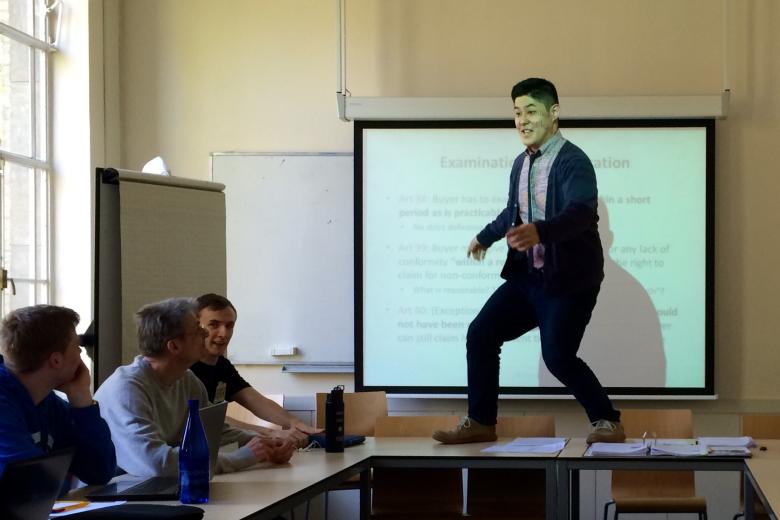The Harmonization of European Law: An Ignorant American’s Perspective
Mark Kawakami: "From a rather ignorant American’s perspective, the cost of learning, debating, and trying to apply the continuously changing (or “harmonizing”) European law is so cumbersome that perhaps it is doing more harm than good to the European legal framework".
There is much emphasis in the European legal discourse about the importance of harmonization and whether it is attainable, sustainable, and/or desirable. The irony in all of this – at least from my rather uninformed, American perspective – is that in continuously proposing new instruments and “better methods” to harmonize European law (see e.g. DCFR, CESL, etc.), the average consumer is left with more choices, but not necessarily with tangible benefits.
As the merits of these new, allegedly harmonizing proposals continue to be discussed amongst the academics, the European Commission appears to lean on the side of caution. In other words, rather than promulgating any measure via a directive or a regulation, the EC opts to appease all parties by making the instruments optional or voluntary in nature (a subject I learned a great deal from a lecture given by my colleague, William Bull, who specializes in this particular area). By increasing the number of choices available via these optional instruments, what the EC is essentially doing is giving businesses and consumers alike a bigger buffet of rules to choose from.
While giving people the freedom to choose is often seen as democratic – or as something inherently good – modern psychologists have suggested that an abundance of choice is not necessarily good, but at times, rather inhibiting and possibly harmful to the actual decision making process. (Iyengar and Lepper, 2000). The phenomenon called the Choice Overload Problem (or similarly the Paradox of Choice) essentially states that giving a consumer an abundance of choice freezes them from actually making an intelligent choice. Even when they do make a choice, there is instant regret (based on the idea of opportunity costs) about not having picked one of the myriad of other possible choices. (Schwartz, 2004). Given this hindrance, some psychologists claim that the more choices that a consumer has, the less likely that they will actually make the purchase. This phenomenon is often illustrated by a study conducted by Proctor & Gamble, which showed that after they reduced the number of Head and Shoulders shampoo available to customers from 26 to 15, Proctor & Gamble increased their sales by 10%. (Osnos, 1997).
I must quickly point out my own ridiculousness here, that yes, I am indeed comparing a business choosing a particular legal framework to a customer picking a particular brand of shampoo, but I posit that the comparison is not too ridiculous as to refute the studies conducted by Iyengar, Lepper, and Shwartz entirely. Following their logic, perhaps what ails the European legal system is not necessarily the debate over whether European harmonization is desirable or whether the European Commission is acting ultra vires when promulgating a particular directive/regulation, but it is the overabundance of these optional instruments, guidelines, and other measures that needlessly increase the number of legal authority that the legal consumer must consider before taking action.
Given this background, there are two major concerns that continue to bother me if this state of overabundance is to continue: 1) entities from non-European countries will be reluctant to do business with European companies relying on the “uncertain” European rules, thus decreasing the attractiveness of doing business with Europe; and 2) even an aspiring student of great intelligence will opt to study a more straightforward and concrete national law for the fear that studying European law is a senseless task, given the very real possibility that by the time they graduate, what they’ve learned is obsolete.
As a former practitioner and a newly self-proclaimed academic, I understand that studying the law is supposed to be a challenge – a worthy one at that. However, when there is an overabundance of legal authorities and a constantly changing scheme, I merely suggest that there ought to be a line drawn somewhere separating a difficult challenge from an absurdly senseless challenge where the goal keeps moving further and further away every time one draws near.
My concluding remark, for which I am soliciting criticism, is that from a rather ignorant American’s perspective, the cost of learning, debating, and trying to apply the continuously changing (or “harmonizing”) European law is so cumbersome that perhaps it is doing more harm than good to the European legal framework.
___________________________
!! If anyone is remotely interested in the subject discussed above, or the relationship between psychology and the law in general, I strongly recommend that you join us for MEPLI’s roundtable on 15 June 2012, where the infinitely awesome, Dr. Gary Low will be presenting “a psychology of choice of law.” I guarantee that it will be a more worthwhile endeavor than reading my post, not to mention that it will actually be educational.
For more information, please follow this link and RSVP by 8 June 2012:
Thanks for reading!
M.T. Kawakami
Teacher. Lawyer. Failed Comedian. Weekend Researcher.
